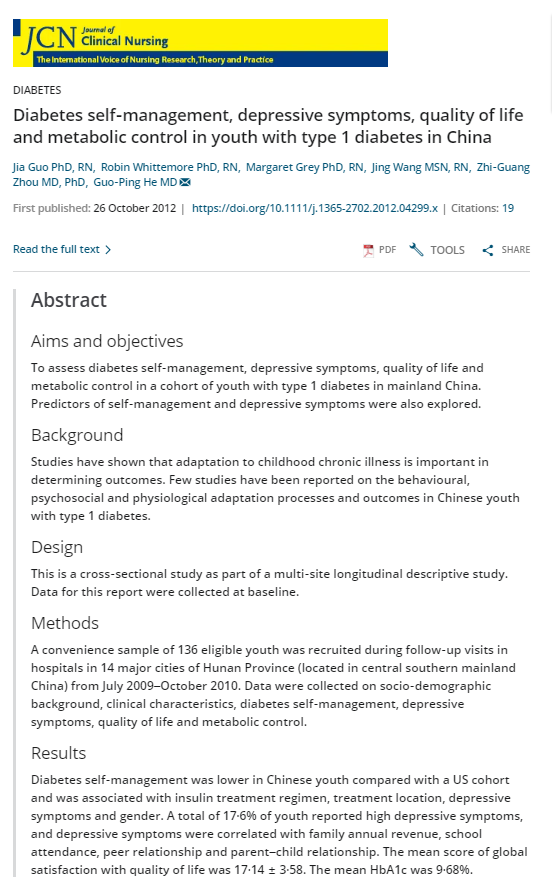Impact Factor:1.972
DOI number:10.1111/j.1365-2702.2012.04299.x
Affiliation of Author(s):中南大学
Journal:Journal of Clinical Nursing
Place of Publication:英国
Abstract:Aims and objectives: To assess diabetes self-management, depressive symptoms, quality of life and metabolic control in a cohort of youth with type 1 diabetes in mainland China. Predictors of self-management and depressive symptoms were also explored. Background: Studies have shown that adaptation to childhood chronic illness is important in determining outcomes. Few studies have been reported on the behavioural, psychosocial and physiological adaptation processes and outcomes in Chinese youth with type 1 diabetes. Design: This is a cross-sectional study as part of a multi-site longitudinal descriptive study. Data for this report were collected at baseline. Methods: A convenience sample of 136 eligible youth was recruited during follow-up visits in hospitals in 14 major cities of Hunan Province (located in central southern mainland China) from July 2009-October 2010. Data were collected on socio-demographic background, clinical characteristics, diabetes self-management, depressive symptoms, quality of life and metabolic control. Results: Diabetes self-management was lower in Chinese youth compared with a US cohort and was associated with insulin treatment regimen, treatment location, depressive symptoms and gender. A total of 17·6% of youth reported high depressive symptoms, and depressive symptoms were correlated with family annual revenue, school attendance, peer relationship and parent-child relationship. The mean score of global satisfaction with quality of life was 17·14 ± 3·58. The mean HbA1c was 9·68%. Conclusions: Living with type 1 diabetes poses considerable challenges, and Chinese youth report lower self-management than US youth and high depressive symptoms. Metabolic control and quality of life were sub-optimal. Relevance to clinical practice: More clinic visits, treatment for high depressive symptoms and an intensive insulin regimen may improve diabetes self-management for youth with type 1 diabetes in China. Culturally appropriate interventions aimed at helping them adapt to living with the disease and improving outcomes are urgently needed.
Note:Q1区
Co-author:Robin Whittemore, Margaret Grey, Jing Wang, Zhiguang Zhou
First Author:Jia Guo
Indexed by:Journal paper
Correspondence Author:Guoping He
Discipline:护理学
Document Type:J
Volume:22
Issue:1-2
Page Number:69-79
Translation or Not:no
Included Journals:SCI


